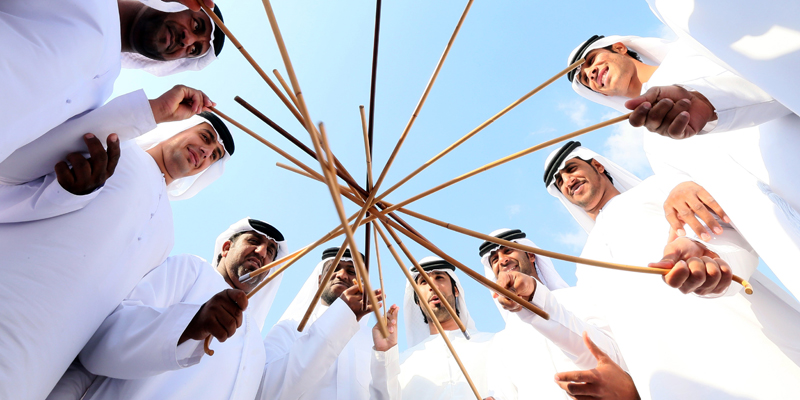Al Azi has been added to UNESCO’s list of cultural heritages that require safeguarding.
It’s a performing art built around the repetition of poems, and it could be in danger of dying out.
The traditional Emirati performance of Al Azi was added to UNESCO’s list of ‘Intangible Cultural Heritage in Need of Urgent Safeguarding’ during a meeting in South Korea this week, in a bid to support the historic art.
Read:
Saudi Arabia has hosted its first-ever concert headlined by a woman
Our favourite looks from Dubai’s first Modest Fashion Week
The recital, which is often performed at national and social events, uses rhyming prose without accompaniment by music or percussion.
“Al Azi’s inclusion in UNESCO’s Intangible Cultural Heritage In Need of Urgent Safeguarding list is reflective of our leadership’s directives to support our authentic cultural heritage, and to emphasise on its importance in building national identity and maintaining communication between different generations,” said Mohamed Khalifa Al Mubarak, chairman of Abu Dhabi’s Department of Culture and Tourism, in a statement.
“It also contributes to the achievement of the Department of Culture and Tourism strategic goals in ensuring that the UAE national heritage is embedded in the constant development and progress of our nation.
“In that context, Al Azi is an important performing art which still enjoys wide public participation, highlighting its historical depth and its significant stature among elements of the UAE’s authentic heritage.”
The performing art isn’t the only Emirati tradition to have made a UNESCO list either, with al majlis, gahwa (Arabic coffee) and falconry—among others—on the committee’s list of Intangible Cultural Heritage of Humanity.
Read:
Saudi’s robot citizen Sophia says she’s fighting for women’s rights
This Lebanese designer redefined the idea of a fairytale wedding gown…
Vietnamese royal music (nha nhac) and the “bird language” of villagers in northern Turkey were among the other additions to the list of ‘Intangible Cultural Heritage in Need of Urgent Safeguarding’.
Images: Getty











